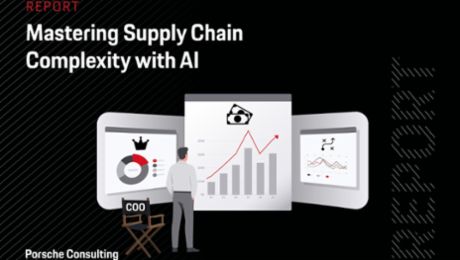Covid-19 set off a domino effect as one national economy after the other began entering a crisis mode. Almost every day we see public policy, business, and financial experts present new facts and figures about the economy. They frequently draw comparisons to the global recession sparked by the collapse of the Lehman Brothers investment bank in 2008. At that time it was the international banking sector that sent shock waves rippling through the real economy. Now it is the other way around. With businesses closed, container ports deserted, trade fairs cancelled, air traffic at almost a standstill, and nearly a billion people under lockdown or other contact restrictions, exports have plummeted and global consumption stands in shock. Financial markets are experiencing enormous turbulence and the price of oil is in free fall. Yet another difference defies comparison with 2008: the global economy will fall twice as far as it did then. The International Monetary Fund (IMF) anticipates the most severe global recession in almost a century.
Run on the banks
When many companies began feeling the effects of the pandemic in March 2020 in the form of falling demand and shortages in supply, the banks saw a run on their services. “The need for liquidity was relatively stable over recent years, but financial institutions are now having to meet a steep and sudden rise in demand,” says Dr. Stephen Hellhammer, a partner at Porsche Consulting. The banks are scrambling to resuscitate the economy with the help of loans—no easy task given the dynamics of the pandemic. “On the one hand, we obviously have to minimize risk for ourselves, yet at the same time we want to give our clients the greatest possible support,” says Stephan Ortolf, who heads the corporate customer division of DZ Bank in Frankfurt am Main. One thing is clear: not every company will survive this crisis. “A crucial factor is whether it was already having trouble before the pandemic, and also whether its business model will be viable in the future,” explains Ortolf. He is very well informed about the current situation of many business owners and managing directors. “Most of our clients are stable, and are also able to tighten their belts for a protracted period of time. But they are concerned. No one knows, of course, how long this situation will go on.”
Since March, nearly all of DZ Bank’s 250 corporate account managers have been advising their clients—medium to large-sized companies and multinational corporations—on all financial matters from offices set up at their homes. “Our account managers and loan analysts are working overtime right now,” says Ortolf. Within just a few weeks, the bank had received nearly 40,000 queries by phone and e-mail. “By early May 2020 the virus had triggered an increased need for liquidity of 4.5 billion euros,” he reports. Government assistance programs are expected to cover three billion euros. DZ Bank is working to provide 1.5 billion by means of new loans, syndicated loans, and extended lines of credit. “But this figure could easily end up being considerably higher,” Ortolf observes.
“DZ Bank was well prepared for the onslaught,” says Porsche consultant Hellhammer, who has been advising the bank for years now. “Meeting these additional requirements promptly is an enormous task that demands a lot from the employees—all the more so because they were moving their work stations to their homes at the same time. That is only possible with digital technology plus flexibility and motivation on everyone’s part.” Ortolf explains that in addition to channeling government loans from KfW Bank, DZ Bank provides special financial products such as factoring and forfeiting services in connection with assistance programs as well as promissory notes and especially loans. Green bonds also continue to be popular. “Medium-sized companies, which here in Germany are funded primarily by their own equity or by [bank] loans, have a lot of needs right now,” he says. “Over time, the drop in sales and the risk of payment defaults will lead to a shortage of funds. By contrast, large corporations are more diversified and have better access to capital markets. They’re also benefiting from the experience their Asian locations have gained with the effects of Covid-19.”
Oversight expands scope
Ortolf phones or holds video conferences with his clients on a daily basis. Speed is of the essence. “We seek the best possible solution for each and every customer, and are willing to take risks in the process—if they are carefully considered. After all, we can only overcome this crisis together,” he says. DZ Bank and other financial institutions are also benefiting from a temporary loosening of certain equity and loan-related requirements by the German financial regulatory authority BaFin and the European Central Bank. Experts estimate that has generated an additional credit capacity of up to nine trillion euros.
Not every loan application is successful. Some companies fall through the cracks. Evaluations consider a number of factors such as credit histories, capital resources, loan amounts, ratings, and prospects for the respective sectors. “Our credit policies have strong safeguards, of course,” says Ortolf. “But the current adjustments mean that we actually have more leeway right now in our decisions. A company that was in good shape before the crisis but is now losing revenue or deferring payments is not automatically given a red light. Instead what we try to do is assess on an individual basis what the ‘post-corona’ outlook will be—to the extent that’s possible.”
Innovation as a lifeline
The extent of the pandemic’s consequences for the global economy will depend above all on the duration of the virus-containment measures and the step-by-step reintroduction of normal social and economic routines. But Ortolf is optimistic. “I’m convinced that the innovative power of German companies will outlast the crisis. Moreover, we’re going through a high-octane version of the digital transformation right now. This boost will generate new ideas and business models for us all.”
Survey: Mid-sized businesses worried
DZ Bank wanted more precise knowledge about how medium-sized businesses in Germany are doing, so it surveyed more than 1,000 companies in April 2020. One in five respondents had already applied for government assistance. More than half had furloughed employees. Eight percent had already cut jobs or were planning to do so at the time of the survey. But 60 percent were using company vacation shutdowns to avoid layoffs due to overtime.Twelve percent reported having restructured their business models during the shutdown. These include primarily smaller companies with annual sales of less than five million euros.
In light of the current recession, most of these companies are viewing the future in substantially more pessimistic terms than before. While three quarters of them described their situation as “good” or “very good” before Covid-19, now only half do. Companies in the metal-building, mechanical engineering, and automotive industries as well as in service industries like the trade fair, restaurant, and tourism sectors have been especially hard hit. Those in the construction, chemical, pharmaceutical, and plastics industries as well as agriculture are considerably more confident. They are largely unaffected by the negative ramifications, or—like some parts of the food and IT sectors—are even seeing higher sales.
Digital preparation with Porsche Consulting
In addition to blending solidarity and empathy with solid risk management, DZ Bank also needs to be quick in its response. To master the wave of virus-related tasks even more effectively, it worked with Porsche Consulting to set up a virtual environment within just a few weeks. This combines all the information and major applications into a system that account managers can use while working from home. An electronic signature tool is expected to accelerate work by enabling seamless document transfer. DZ Bank also benefits from numerous digitalization initiatives in the past. Before the crisis it had already worked with the management consultancy to introduce digital credit files. In addition, a standardized process for the corporate customer sector is being set up to continuously evaluate all processes and derive improvements.






